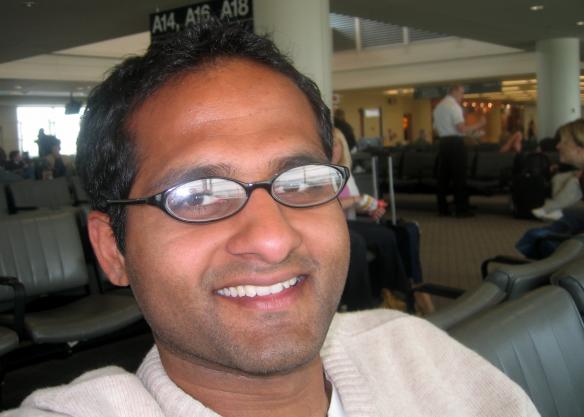Contribute
| In Conversation With Ani Vallabhaneni |
Ranjani Saigal
06/09/2011
Ani Vallabhaneni is an MBA student at the MIT Sloan School of Management. At Sloan, he is a fellow at the Legatum Center for Development and Entrepreneurship and a co-president of Sloan Entrepreneurs for International Development. Prior to MIT, Ani managed a chain of dialysis clinics for low-income patients in the Philippines. With a background in technology and operations, he has also built startups in India and United States.
He is a member of the Sanergy team which won the prestigious MIT 100K award. Sanergy permanently reduces sanitation-related diseases in Africa's slums by making hygienic sanitation affordable, accessible, and sustainable. Their team of engineers from MIT and University of Nairobi have developed a low-cost high-quality sanitation center. They franchise a dense network of these sanitation centers across the slums to local entrepreneurs who run them as viable businesses. They collect the waste from each center and convert it to electricity and fertilizer that they sell for a profit
Vallabhaneni spoke to Lokvani about the company.
1) What motivated you to take on a problem that most in the world would consider as unsolvable? What gave you the confidence that you could solve such a large problem?
Growing up in India, lack of sanitation was a fact of life. The reality was the same even when I was living in the Philippines. But working in these resource constrained settings also trains you to be very resourceful and adaptable. The entire Sanergy team has lived and worked abroad in these type of environments and it gives us a unique perspective. On our first trip to Nairobi, Kenya in January 2010, we met a youth group in the slums that was trying to run a toilet as a business. Though they lacked the right technology and a viable business model, they had great entrepreneurial spirit. Seeing their tremendous motivation to change their own communities inspired us to tackle this enormous challenge.
Perhaps the reason we started on Sanergy was because we didn't know enough to fail.The resources, education, and mindset encouraged at MIT is to think big, be bold, and start with the toughest problems. MIT Sloan, especially, emphasizes the importance of taking a systems-based approach to designing solutions rather than just patching the small immediate problem. And that is the approach that we have taken with Sanergy. At MIT (MIT100K, MIT Public Service Center, MIT D-Lab, MIT Legatum Center) and beyond (for example: we recently received fellowships from Echoing Green and Mulago Foundation), we have found a great network of mentors and funders that have helped us shape our strategy and improve our model and put us on the path to success.
Could you briefly describe the mission and vision of Sanergy?
Sanergy is working to permanently reduce sanitation related disease, starting with Africa's slums, by making hygienic sanitation accessible, affordable, and sustainable. 8Mn people in Kenya's slums, and 2.6Bn worldwide, lack access to adequate sanitation. The resulting disease kills nearly 1.6Mn children each year. In these areas that lack basic sewage infrastructure, tackling the sanitation crisis requires more than just building toilets. We are taking an innovative systems-based approach to building out the entire sanitation value chain in three parts: build, collect, convert. See attached summary for more details on the model. Please feel free to take material from the document, but please do not post the document itself anywhere.
For a Social Enterprise to win the 100K is a rare event. Why do you think the judges picked Sanergy over competitors which had products that could potentially reap large financial profits?
I'll let the Judges share their thoughts directly. Here's a recent interview by Jason Margolis from PRI's The World. There are a couple of quotes from one of the judges Tim Rowe (Founder of Cambridge Innovation Center and a VC) about why they selected us: http://bit.ly/liBclg
Audio is at the top of the link and transcript is below.
We didn’t give the prize because these guys are doing something great for the world, or better for the world, than the other guys,†said Tim Rowe, a judge this year. He founded the Cambridge Innovation Center, a business incubator, across the street from MIT. “That wasn’t our challenge as judges. Our challenge was to look at each of these as a stand-alone business and say: ‘What has the biggest chance of significant success?’ The fact that they are making money at this is what makes it likely to succeed,†said Rowe.
With your skills and an MBA from MIT you could surely take on a career that could provide large financial benefits. What motivated you to put your energy into Social Enterprise which some would claim is a risky business especially in terms of financial returns?
I strongly believe that financial benefit and social impact are not mutually exclusive and we hope that Sanergy becomes a proof point for that. The win at the MIT100K where we went up against other "mainstream" businesses is another validation that financial returns are on par with all the other businesses that they evaluated. As a first generation immigrant to this country, like many of your readers, we know that real opportunity lies where others perceive risk. This is the career that will provide the real financial benefits. And perhaps even some good karma along the way! :-)
What is the secret to Sanergy's success?
An amazing, talented, and dedicated group of colleagues. Change is definitely a team sport.
10 years from now what is your vision for Sanergy?
The sanitation problem is so massive that we will not solve it alone. We want to be the model that others adapt and replicate over and over to improve their own communities.
Thank you for your time.
Thank you.
You may also access this article through our web-site http://www.lokvani.com/
